SDTEST® has 36 different VUCA polls that calculate the 13,034 correlation values between stages of development according to the theory of Spiral Dynamics and answer options of these 36 polls.
We invite curiosity about the systemic mechanisms behind this correlation. There may be hidden variables that provide alternative explanations.
-0.2948 between the Domain, product, service, and the Purple stage.
The critical value of the correlation coefficient for a normal distribution, by William Sealy Gosset (Student) r = 0.2334. This negative correlation of -0.2948 meets the reliability criteria but does not necessarily imply causation.
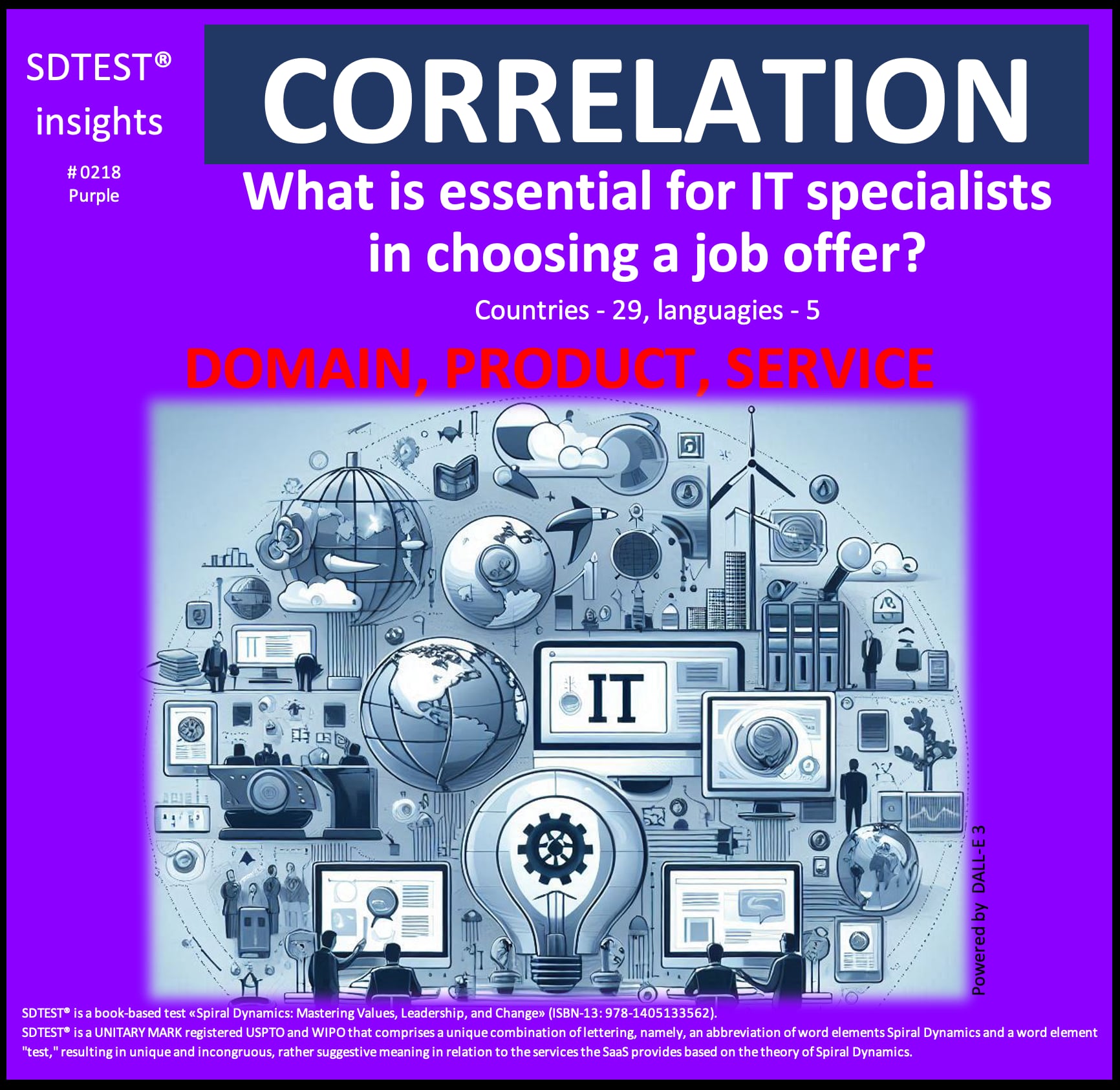
The negative correlation of -0.2948 between the Domain, product, service, and the Purple stage reveals profound insights about what IT specialists operating in the Purple value system consider essential when choosing a job offer:
This correlation suggests that for IT specialists operating in the Purple value system, the specific domain, product, or service is less important than finding a role that aligns with their more profound spiritual and communal values.
Organizational Perspective:
Organizations embracing the Purple mindset might interpret this correlation as indicating that IT specialists value:
- A work environment that honors ancestral wisdom and traditions.
- Companies that integrate spiritual practices into their corporate culture.
- Opportunities to serve a greater communal purpose beyond mere technological advancement.
Organizations might respond by:
- Emphasizing their company's long-standing traditions and heritage in job listings.
- Highlighting rituals or ceremonies that are part of the corporate culture.
- Offering roles that allow IT specialists to act as "tech shamans," bridging ancient wisdom with modern technology.
Team Perspective:
Teams operating from a Purple mindset might approach IT job offerings by emphasizing the following:
- The team's strong sense of familial bonds and tribal unity.
- Opportunities for collective decision-making and shared responsibilities.
- The preservation and application of time-honored IT practices alongside new technologies.
Teams might attract IT specialists by:
- Describing the team as a "tech tribe" with its unique customs and traditions.
- Mentorship programs that resemble elder-apprentice relationships are offered.
- Showcasing how team members support each other like an extended family.
Individual Perspective:
IT specialists aligned with the Purple value system might prioritize the following:
- Jobs that allow them to honor their spiritual beliefs and practices.
- Roles that contribute to the well-being of their community or "tribe."
- Opportunities to learn from respected elders or become elders within the IT community.
Individuals might be drawn to positions that:
- Allow for flexible schedules to accommodate spiritual practices or community obligations.
- Offer ways to use IT skills to serve their local community or traditional way of life.
- Provide a sense of belonging to a greater purpose beyond just technical work.
From this perspective, we are invited to consider:
- How can IT job offerings honor both technological advancement and timeless wisdom?
- What rituals or practices can be integrated into IT work to satisfy the spiritual needs of Purple-minded specialists?
- How can companies create a sense of "tribal belonging" for their IT staff while meeting modern business needs?
Ultimately, this correlation reminds us that for those in the Purple value system, the essential factors in choosing an IT job are not necessarily the technical specifics but rather how the role supports their sense of community, upholds traditional values, and allows for a harmonious blend of ancient wisdom and modern technology. IT specialists operating from this mindset may be seeking more than just a job—they're looking for a place where they can belong, contribute to a greater purpose, and maintain their connection to the spiritual realm, even in the fast-paced world of technology.
In our analysis of the poll "Characteristics of a Talented Employee" (by Talent Management Institute [1]), we found an intriguing positive correlation that warrants closer examination:
0.1599 between the Decision-making skills and the Red stage.
The critical value of the correlation coefficient for non-normal distribution, by Spearman r = 0.018. This positive correlation of 0.1599 meets the reliability criteria but does not necessarily imply causation.
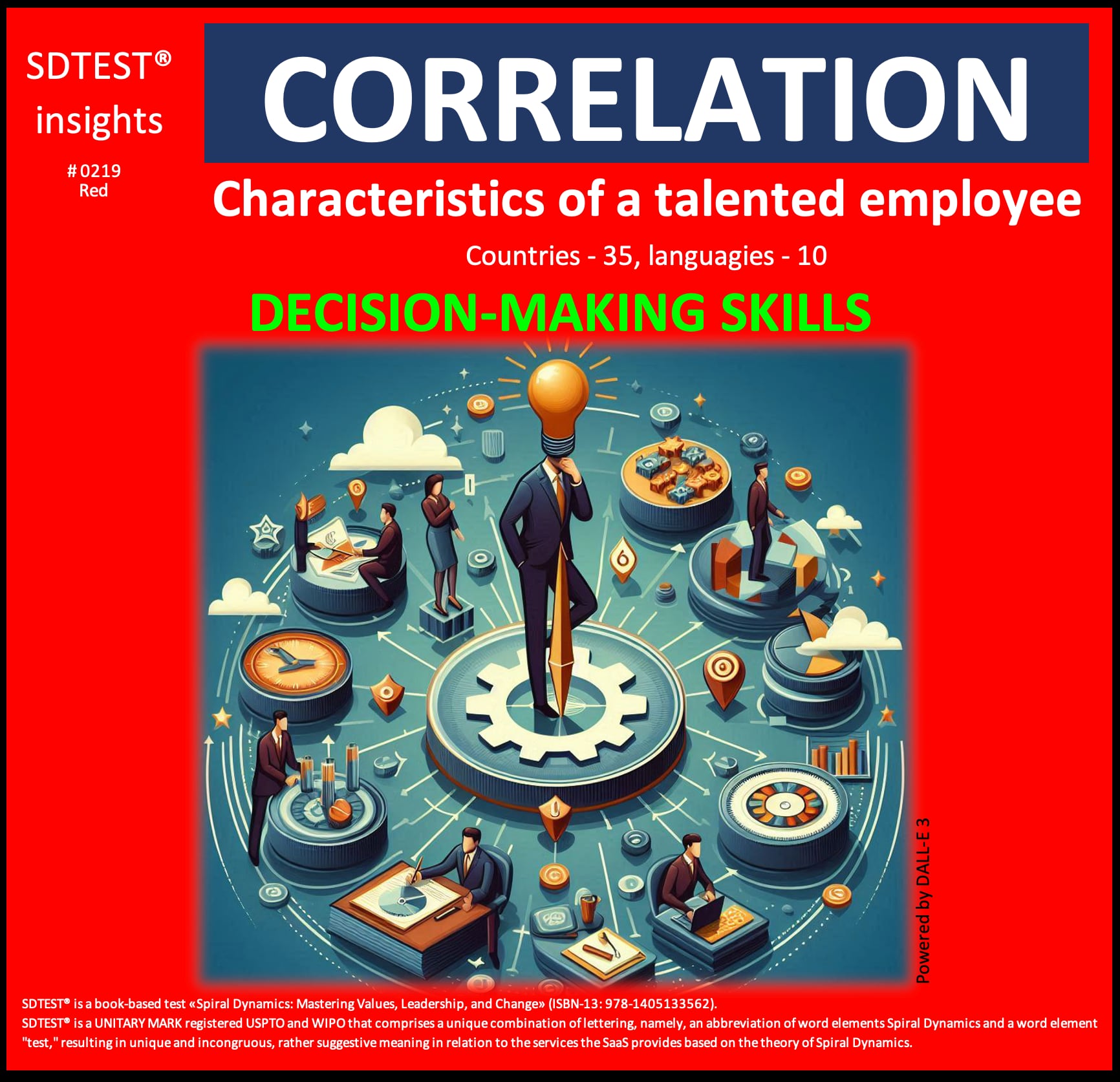
The positive correlation of 0.1599 between Decision-making skills and the Red stage reveals powerful insights about the decision-making approach valued in the Red system:
Organizational Perspective:
Organizations embracing the Red mindset might interpret this correlation as validating the following decision-making skills:
- Swift, instinctive choices without hesitation or deliberation
- Willingness to take high-risk actions for potential high rewards
- Ability to assert dominance and overrule others in decision-making processes
Organizations might cultivate these skills by:
- Rewarding employees who make quick, bold decisions that yield immediate results
- Creating high-pressure scenarios to test and strengthen impulsive decision-making
- Eliminating bureaucratic approval processes in favor of empowering assertive individuals
Team Perspective:
Teams operating from a Red mindset might prioritize these decision-making skills:
- Aggressive advocacy for one's ideas, drowning out competing voices
- Rapid judgment calls based on gut feelings rather than data analysis
- Willingness to make unilateral decisions without seeking consensus
Teams might foster these skills through the following:
- Competitive decision-making exercises where the most forceful idea wins
- Celebrating team members who take decisive action without lengthy consultations
- Encouraging an "act now, apologize later" mentality in decision-making
Individual Perspective:
Individuals aligned with the Red value system might focus on developing these decision-making skills:
- Confidence to make choices without seeking approval or input from others
- Ability to quickly assess situations for personal gain or power advancement
- Fearlessness in making decisions that might be seen as ruthless or self-serving
Individuals might enhance these skills by:
- Practicing making rapid-fire decisions in high-stakes situations
- Learning to trust their impulses and suppress doubts or second-guessing
- Studying influential leaders known for their bold, often controversial decisions
This correlation suggests that effective decision-making is equated with dominance, speed, and a willingness to take risks in the Red value system. The positive link implies that individuals may increasingly value and exhibit these decision-making behaviors as they progress through the Red stage.
Ultimately, this correlation highlights that the most valued decision-making skills in the Red worldview allow for quick, forceful action driven by personal instinct and a desire for dominance. Individuals operating from this mindset may view hesitation, collaboration, or detailed analysis as weaknesses rather than strengths in decision-making.
In our analysis of the poll "I live thinking about my past, present or future," we found an intriguing positive correlation that warrants closer examination:
0.3224 between the Present and the Blue stage (Ukraine, two languages).
The critical value of the correlation coefficient for a normal distribution, by William Sealy Gosset (Student) r = 0.2255. This positive correlation of 0.3224 meets the reliability criteria but does not necessarily imply causation.

The positive correlation of 0.3224 between the Present and the Blue stage in Ukraine (two languages) reveals significant insights about why people might be focusing on the present:
Organizational Perspective:
Organizations in Ukraine operating within the Blue mindset might see the present focus as essential because:
- Immediate adherence to rules and protocols is crucial for organizational survival in wartime.
- Current challenges demand unwavering attention to maintain order and structure.
- Present-focused decision-making is vital to navigating rapidly changing circumstances.
Organizations might emphasize present focus by:
- Implementing daily briefings on current situations and immediate objectives.
- Stressing the importance of following present protocols to ensure safety and efficiency.
- Reward employees who demonstrate present-moment solid awareness of crisis management.
Team Perspective:
Teams operating from a Blue mindset in Ukraine might prioritize present focus because:
- Immediate team cohesion and discipline are critical in handling current threats.
- Present-moment awareness is essential for the effective execution of assigned duties.
- Focus on current roles and responsibilities ensures the team's stability amidst chaos.
Teams might foster present focus through:
- Regular drills and training sessions focused on current scenarios and immediate responses.
- Emphasizing clear communication about present tasks and expectations.
- Reinforcing the importance of being fully present during team operations and meetings.
Individual Perspective:
Individuals aligned with the Blue value system in Ukraine might focus on the present because:
- Concentrating on current duties provides a sense of purpose and control amid uncertainty.
- Adherence to present moral codes and rules offers stability in chaotic times.
- Immediate vigilance is necessary for personal and community safety.
Individuals might maintain present focus by:
- Developing routines that emphasize current responsibilities and immediate tasks.
- Practicing mindfulness techniques to stay alert to present surroundings and potential dangers.
- Seeking ways to contribute to current community needs, reinforcing a sense of present purpose.
This correlation suggests that in the Blue value system, especially in the context of war in Ukraine, the present focus is closely tied to maintaining order, fulfilling duties, and ensuring immediate safety. The positive link implies that as individuals progress through the Blue stage, they may increasingly value and exhibit present-focused behaviors to cope with and navigate current challenges.
Ultimately, this correlation highlights that focusing on the present in the Blue worldview in Ukraine is likely seen as a moral and practical necessity. It suggests that individuals and organizations operating from this mindset view present-moment awareness and action as critical for upholding societal structures, maintaining personal integrity, and navigating the immediate challenges posed by the ongoing war.
In our analysis of the poll "12 ways to build trust with others" (by Justin Wright [2]), we found an intriguing negative correlation that warrants closer examination:
-0.2056 between the Ask for feedback (It shows you're open to growth and change) / Agree and the Orange stage.
The critical value of the correlation coefficient for a normal distribution, by William Sealy Gosset (Student) r = 0.1785. This negative correlation of -0.2056 meets the reliability criteria but does not necessarily imply causation.
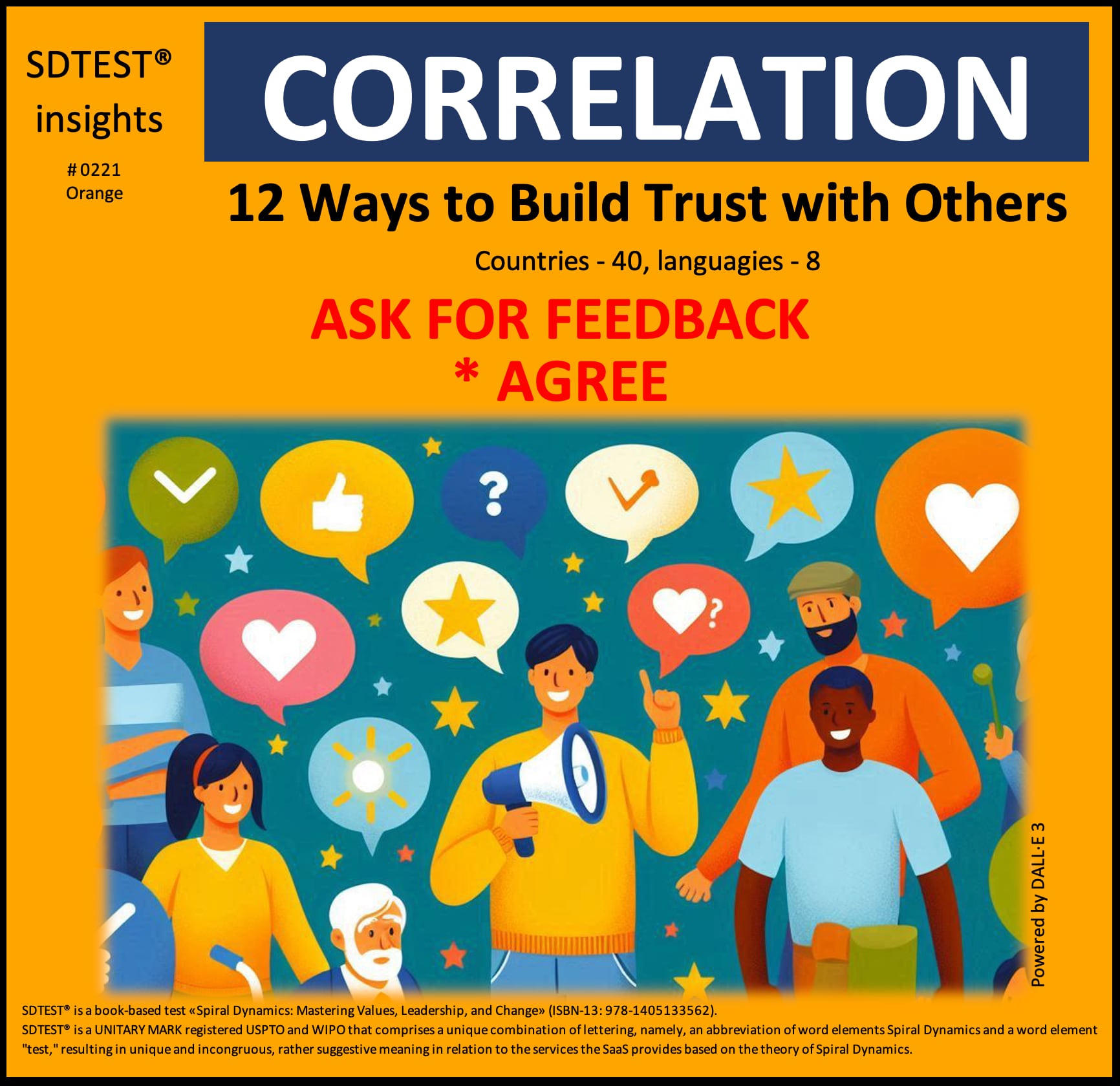
This negative correlation of -0.2056 between "Ask for feedback (It shows you're open to growth and change) / Agree" and the Orange stage provides intriguing insights when viewed through the lens of the Orange value system:
Organizational Perspective:
Organizations operating within the Orange mindset might interpret this correlation as:
- Validation of their focus on self-reliance and individual expertise rather than external feedback.
- Confirmation that achievement-oriented approaches may not prioritize asking for feedback.
- Indication that growth and change are driven more by measurable results than by others' opinions.
These organizations might respond by:
- Implementing data-driven performance metrics instead of subjective feedback systems.
- Encouraging employees to focus on objective goal achievement rather than seeking approval.
- Investing in cutting-edge technology and training to enhance individual capabilities.
Team Perspective:
Teams operating from an Orange mindset might approach this correlation by:
- Viewing it as justification for prioritizing results-oriented teamwork over consensus-building.
- Interpreting it as support for fostering a competitive, rather than collaborative, team environment.
- Seeing it as an opportunity to focus on innovative problem-solving rather than seeking external input.
These teams might respond by:
- Implementing objective performance metrics for team evaluation.
- Encouraging team members to propose solutions based on data and logic rather than seeking feedback.
- Fostering a culture of individual accountability and recognition for measurable achievements.
Individual Perspective:
Individuals aligned with the Orange value system might interpret this correlation as:
- Validation of self-reliance and personal expertise in driving success.
- Confirmation that growth comes more from personal achievement than from others' opinions.
- Justification for prioritizing objective self-assessment over seeking external feedback.
These individuals might respond by:
- Focusing on developing technical skills and knowledge to enhance personal competitiveness.
- Setting ambitious personal goals and measuring progress through quantifiable metrics.
- Approaching growth and change as processes driven by rational analysis and scientific methods.
This correlation affirms the Orange value system's emphasis on individual achievement and skepticism towards subjective inputs. As individuals progress in the Orange stage, they may become less inclined to seek feedback and more focused on personal accomplishments and objective self-evaluation.
From this Orange perspective, the correlation invites us to explore:
- How does the reduced emphasis on feedback-seeking impact innovation and progress?
- What role does objective data play in personal and organizational growth compared to subjective feedback?
- How can we balance the drive for individual achievement with the potential benefits of external perspectives?
Ultimately, this correlation underscores the Orange value system's focus on reason, science, and measurable outcomes. As individuals and organizations align more strongly with Orange values, they may prioritize objective achievement and self-reliance over seeking external feedback, viewing growth and change as processes best driven by rational analysis and verifiable results.
In our analysis of the poll "The Five Dysfunctions of a Team" (by Patrick Lencioni [3]), we found an intriguing positive correlation that warrants closer examination:
0.47 between the Absence of Trust (Without trust, teams cannot function at their optimum. Trust isn't just about believing in skills; it's about vulnerability-based trust) and the Green stage (France, four languages).
The critical value of the correlation coefficient for a non-normal distribution, by Spearman r = 0.2708. This positive correlation of 0.47 meets the reliability criteria but does not necessarily imply causation.

The positive correlation of 0.47 between the Absence of Trust and the Green stage in France (four languages) offers profound insights into team dynamics, especially when considering modern French life conditions:
Organizational Perspective:
Organizations in France operating within the Green mindset might view the Absence of Trust as critical because:
- It hinders integration in France's increasingly diverse workforce, including immigrants and multiple generations.
- It exacerbates tensions arising from France's ongoing social and economic challenges, such as inequality and job insecurity.
- It undermines efforts to address pressing environmental concerns, a key focus in modern French policy and business.
Organizations might address this by:
- Implementing inclusive policies that respect France's principle of laïcité while fostering cultural understanding.
- Creating transparent dialogue spaces to address concerns about job security and economic uncertainty.
- Developing trust-building initiatives that align with France's push for sustainable and ethical business practices.
Team Perspective:
Teams in France might see the Absence of Trust as dysfunctional because:
- It impedes collaboration in France's evolving work culture, which is moving towards more flexible and remote arrangements.
- It hinders the integration of diverse perspectives crucial for innovation in France's competitive global market.
- It exacerbates stress in a country grappling with work-life balance issues and burnout concerns.
Teams might combat this by:
- Adopting collaborative tools that foster connection in France's growing digital work environment.
- Implementing consensus-based processes that value diverse voices, reflecting France's multicultural society.
- Creating spaces for open dialogue about work-related stress and collective well-being.
Individual Perspective:
Individuals in France aligned with the Green value system might view the Absence of Trust as problematic because:
- It contradicts the French value of "fraternité" (brotherhood) in professional settings.
- It limits personal growth opportunities in a job market that increasingly values soft skills and emotional intelligence.
- It hinders the ability to effectively navigate France's complex social and professional networks.
Individuals might build trust by:
- Embracing vulnerability in a culture that traditionally values privacy and professional distance.
- Actively engaging in intercultural exchanges, reflecting France's diverse, multilingual environment.
- Participating in community-oriented initiatives that align with France's strong tradition of social engagement.
This correlation, in the context of modern France, invites us to explore:
- How can teams build trust while respecting France's secular principles and diverse cultural backgrounds?
- What role does trust play in addressing France's challenges, such as social inequality and climate change?
- How can we foster trust in a society grappling with political polarization and social tensions?
This correlation in multilingual France underscores the complexity of trust-building in a diverse, globalized nation. It highlights how the Absence of Trust can be particularly acute in a country experiencing significant social, economic, and environmental transitions.
The Absence of Trust is seen as a fundamental dysfunction because it prevents teams from embodying the values of unity and collective progress that are central to both the Green worldview and France's national motto of "Liberté, Égalité, Fraternité." In a nation striving to maintain its cultural identity while embracing global interconnectedness, trust within teams becomes a microcosm of the more considerable societal challenges and aspirations.
Ultimately, this correlation suggests that as France progresses through the Green stage, there's a growing recognition of trust deficits and their impact on collective well-being and progress. Addressing this dysfunction becomes a matter of team effectiveness and a reflection of broader societal goals for a more inclusive, sustainable, and harmonious future.
In our analysis of the poll "Real Freedom Is," we found an intriguing positive correlation that warrants closer examination:
0.1772 between the Following the rules and upholding traditions / Disagree and the Yellow stage.
The critical value of the correlation coefficient for a normal distribution, by William Sealy Gosset (Student) r = 0.1228. This positive correlation of 0.1772 meets the reliability criteria but does not necessarily imply causation.
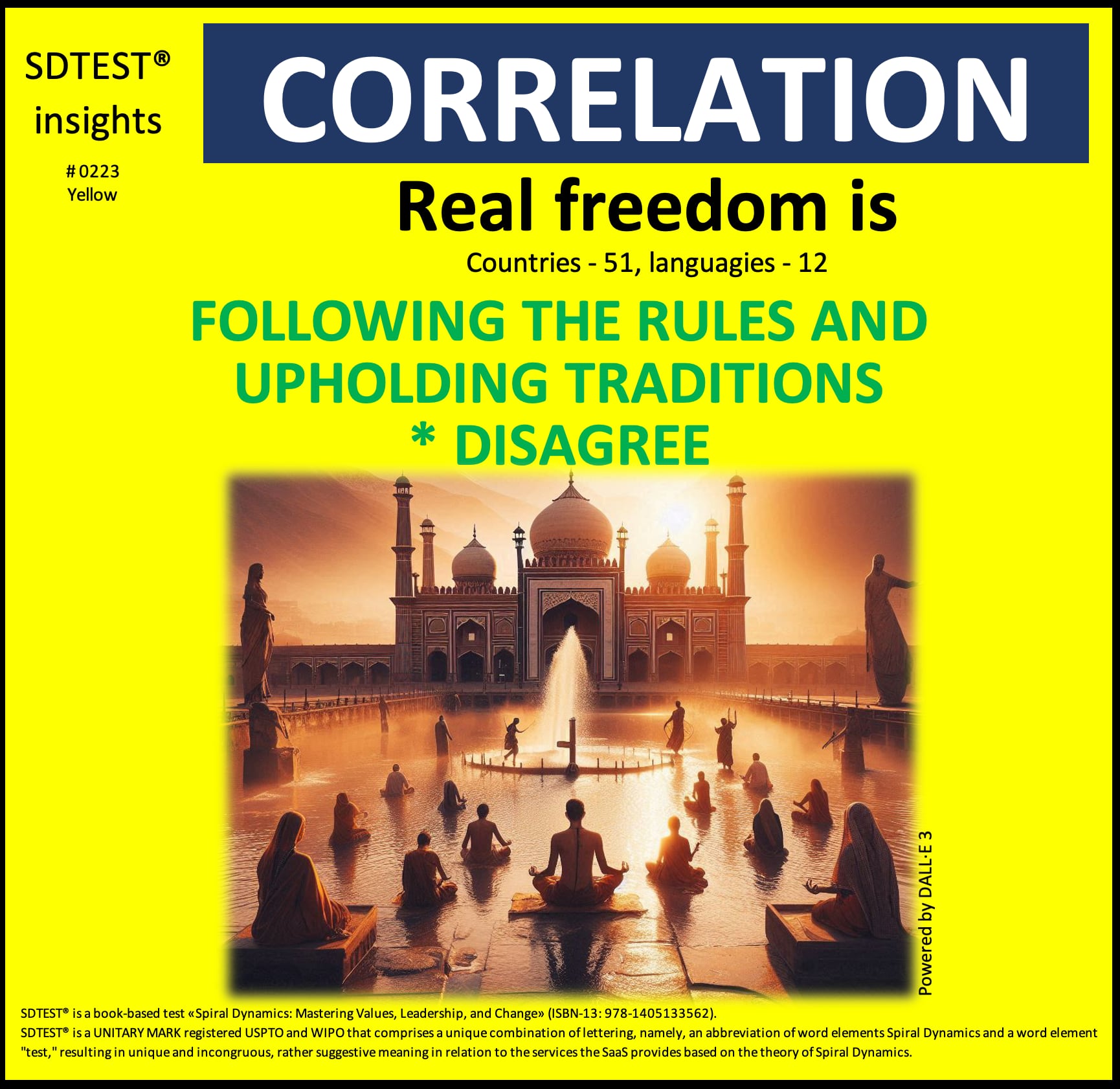
This positive correlation of 0.1772 between disagreeing that "Following the rules and upholding traditions" constitutes real freedom and the Yellow stage offers fascinating insights when viewed through the lens of the Yellow value system:
Organizational Perspective:
Companies operating within the Yellow mindset might interpret this correlation as:
- Validation of their flexible, adaptive approach to organizational structures and processes.
- Confirmation that true innovation often requires transcending traditional rules and norms.
- An opportunity to redefine "freedom" in the workplace as the ability to navigate complex systems creatively.
These organizations might respond by:
- Implementing dynamic governance models that allow for the constant evolution of rules and traditions.
- Encouraging employees to question and reimagine established practices through systemic thinking.
- Developing frameworks that balance individual autonomy with collective responsibility and purpose.
Team Perspective:
Teams operating from a Yellow mindset might approach this correlation by:
- Viewing it as an invitation to reassess and adapt team norms and processes continually.
- Interpreting it as support for fostering a constructive rule-breaking and tradition-challenging culture.
- Seeing it as an opportunity to explore how different concepts of freedom can coexist within a team.
These teams might respond by:
- Implementing regular "rule and tradition audits" to assess which practices serve the team's evolving purpose.
- Encouraging members to propose alternative approaches that integrate multiple value systems.
- Fostering dialogue about the nature of freedom and its relationship to team effectiveness and individual growth.
Individual Perspective:
Individuals aligned with the Yellow value system might interpret this correlation as:
- Personal validation of their ability to see beyond conventional definitions of freedom.
- Confirmation that personal growth often involves transcending societal norms and expectations.
- An invitation to explore how different concepts of freedom can be integrated into a holistic worldview.
These individuals might respond by:
- Actively seeking opportunities to understand and integrate diverse perspectives on freedom and rule-following.
- Developing personal practices that balance respect for valuable traditions with the courage to break unproductive rules.
- Reflect on how their concept of freedom impacts their interactions with various social systems.
This correlation affirms the Yellow value system's emphasis on personal growth and systemic understanding. As individuals progress in the Yellow stage, they develop a more nuanced, context-dependent view of freedom beyond simple rule-following or tradition-upholding.
Ultimately, this correlation underscores the Yellow value system's focus on integration, complexity, and transcendence. Individuals and organizations align more strongly with Yellow values, developing a more sophisticated understanding of freedom that acknowledges the value of rules and traditions while recognizing the need to transcend them in service of higher-order goals and more complex understandings of reality.
The correlation prompts us to consider freedom not as a fixed state or simple adherence to norms but as a dynamic capacity to navigate, integrate, and reshape complex systems. This Yellow-stage perspective on freedom could be crucial in addressing our time's interconnected, global challenges, which often require us to think and act beyond traditional boundaries and rules.
-0.8608 between the Employees were sent on unpaid vacation and the Turquoise stage (Poland, three languages).
The critical value of the correlation coefficient for a normal distribution, by William Sealy Gosset (Student) r = 0.7727. This negative correlation of -0.8608 meets the reliability criteria but does not necessarily imply causation.
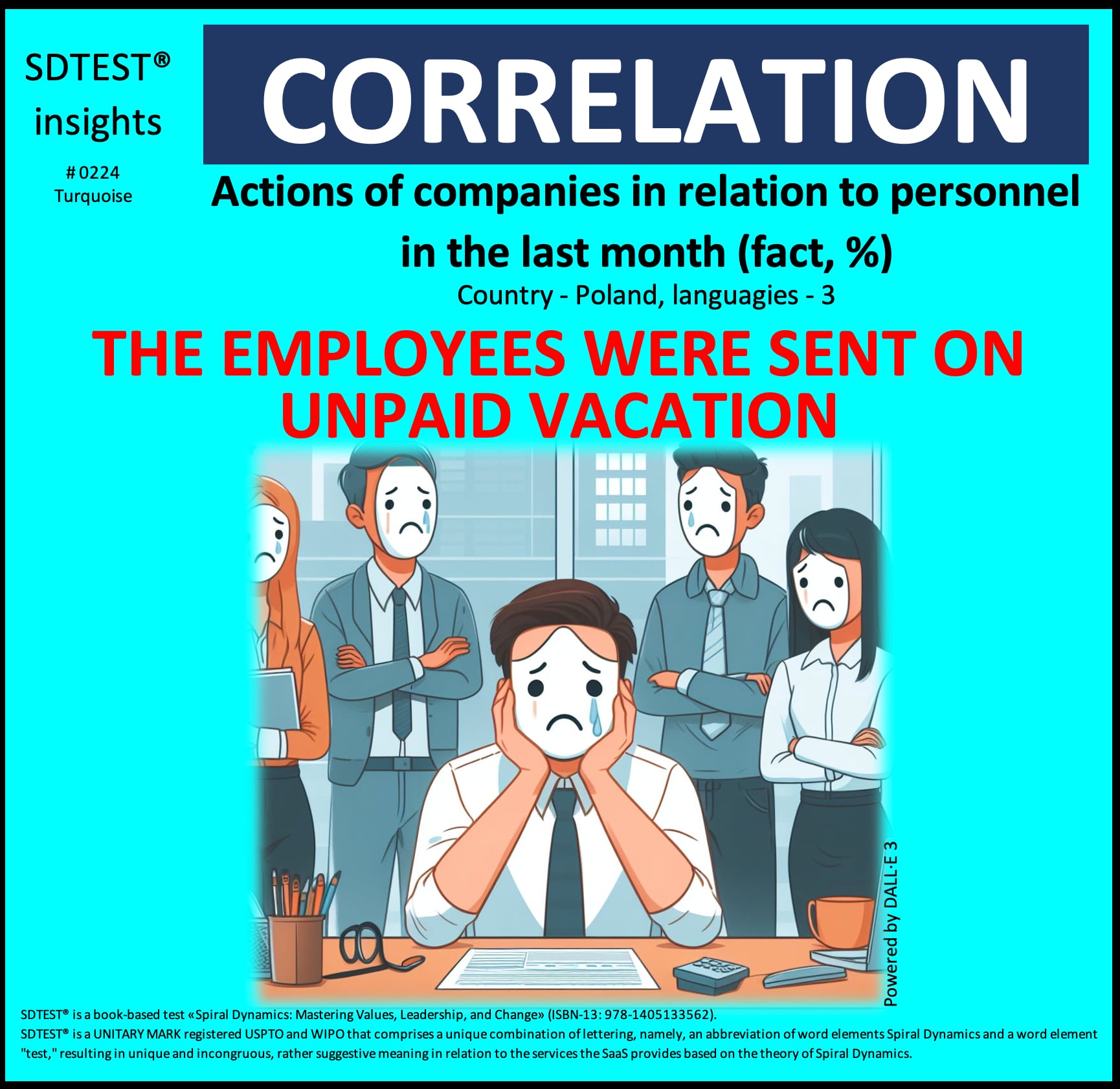
This negative correlation of -0.8608 between employees being sent on unpaid vacation and the Turquoise stage offers intriguing insights when viewed through the lens of the Turquoise value system in the Polish context:
Organizational Perspective:
Organizations operating within the Turquoise mindset in Poland might interpret this correlation as:
- Validation of a more integrated approach to employee well-being, reflecting Poland's evolving work culture.
- An opportunity to pioneer sustainable workplace practices that align with Poland's growing environmental consciousness.
- Justification for prioritizing long-term societal harmony over short-term gains, in line with Poland's post-communist societal transformation.
These organizations might respond by:
- Developing flexible work models that balance individual needs with Poland's economic realities.
- Implementing policies that view employees as integral to Poland's social fabric and economic growth.
- Actively seeking ways to create value for all stakeholders, including employees, local communities, and Poland's natural environment.
Team Perspective:
Teams operating from a Turquoise mindset in Poland might approach this correlation by:
- Viewing it as an invitation to co-create more resilient work structures within Poland's evolving economic landscape.
- Interpreting it as a call to deepen understanding of the interconnectedness of work, life, and Poland's societal progress.
- Seeing it as an opportunity to foster a more inclusive work culture that embraces Poland's diverse workforce.
These teams might respond by:
- Engaging in collaborative problem-solving to address challenges without taking unpaid vacations, considering Poland's labor laws and social safety nets.
- Embracing diverse perspectives to develop holistic solutions that benefit all, reflecting Poland's growing multiculturalism.
- Cultivating a team culture that values individual growth and collective well-being, in line with Poland's emerging focus on work-life balance.
Individual Perspective:
Individuals aligned with the Turquoise value system in Poland might interpret this correlation as:
- Personal validation of their understanding of the interconnectedness of Polish society and economy.
- An opportunity to advocate for more integrated workplace practices that reflect Poland's evolving social values.
- Justification for pursuing work that aligns with their values of holistic well-being and sustainability within the Polish context.
These individuals might respond by:
- Seeking ways to contribute to creating more conscious organizations in Poland's business landscape.
- Engaging in dialogue to bridge different perspectives on work-life integration in Polish society.
- Actively participating in initiatives promoting personal and collective flourishing in Poland's communities.
This correlation, viewed through the Turquoise lens in Poland, suggests that those operating at the Turquoise level may be more inclined to seek alternatives to unpaid vacations. This reflects Poland's journey towards more progressive and holistic work environments. It implies that the Turquoise value system's characteristics align with Poland's ongoing societal transformation, moving towards more sustainable and employee-centric practices.
Ultimately, this correlation speaks to the complex relationship between Poland's evolving consciousness and workplace practices. It reminds us that in the Turquoise worldview, creating harmonious, sustainable work environments may offer more value than short-term measures, potentially contributing to Poland's continued social and economic development.
What insights do you gain from today's correlation? How might we study this relationship more carefully before deducing causation?
We welcome respectful and wise perspectives! Stay tuned every week as we share more results and insights.
After login or registration, free access to the poll results in the FAQ section.
[1] https://www.linkedin.com/company/talent-management-institute/
[2] https://www.linkedin.com/in/jwmba/
[3] https://www.linkedin.com/in/patrick-lencioni-orghealth/
2024.08.11
FearpersonqualitiesprojectorganizationalstructureRACIresponsibilitymatrixCritical ChainProject Managementfocus factorJiraempathyleadersbossGermanyChinaPolicyUkraineRussiawarvolatilityuncertaintycomplexityambiguityVUCArelocatejobproblemcountryreasongive upobjectivekeyresultmathematicalpsychologyMBTIHR metricsstandardDEIcorrelationriskscoringmodelGame TheoryPrisoner's Dilemma
Valerii Kosenko
Chủ sở hữu sản phẩm SaaS SDTEST®
Valerii có đủ tiêu chuẩn trở thành nhà tâm lý học sư phạm xã hội vào năm 1993 và từ đó đã áp dụng kiến thức của mình vào quản lý dự án.
Valerii có bằng Thạc sĩ và chứng chỉ quản lý dự án và chương trình vào năm 2013. Trong chương trình Thạc sĩ, anh đã làm quen với Lộ trình Dự án (GPM Deutsche Gesellschaft für Projektmanagement e. V.) và Spiral Dynamics.
Valerii là tác giả khám phá sự không chắc chắn của V.U.C.A. khái niệm sử dụng Động lực xoắn ốc và thống kê toán học trong tâm lý học và 38 cuộc thăm dò quốc tế.








